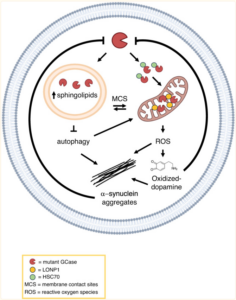
Parkinson’s disease (PD) is a common neurodegenerative condition known for typical motor symptoms associated with the loss of dopaminergic neurons in the substantia nigra. Early genetics studies on familial forms of PD implicated variants in genes related to intracellular trafficking and mitochondrial biology, including SNCA (α-synuclein; a-syn), LRRK2, DJ-1, PINK1, PARKIN, and others1. However, recent large-scale next-generation sequencing studies have identified variants in one allele of the β-glucocerebrosidase (GCase) encoding gene (GBA1) in 5–30% of PD cases, depending on their ancestry1. From a clinical perspective, PD patients harboring GBA1 mutations typically present with early onset of the disease, experience more rapid progression of motor impairment and cognitive decline, and have reduced survival rates2, suggesting that GCase plays a central role in the pathophysiology.

